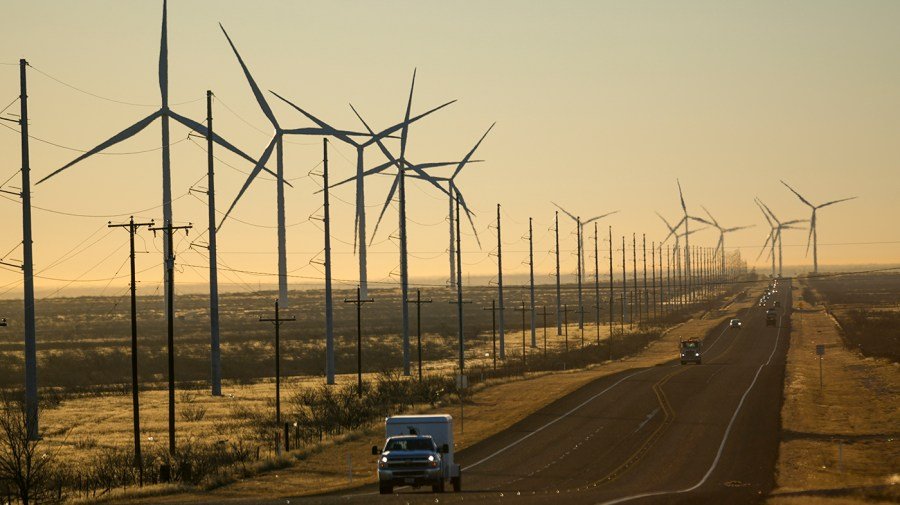
The Trump administration’s agenda megabill passed this week by the Senate and currently under debate in the House contains a slew of provisions that are expected to bolster fossil fuels or harm the build-out of renewable energy — ultimately exacerbating climate change.
The extent of the phaseout of subsidies for green energy sources has been a significant point of contention among Republicans; but, ultimately, the cuts they make are expected to result in deep reductions in subsidies for the sector, even if moderates manage to stave off some of the most dramatic changes.
The ultimate fate of these provisions is up in the air as House conservatives say they won’t accept changes that water down their drastic cuts to the energy incentives.
Less controversial among Republicans are the bill’s cuts to green programs and moves to boost fossil fuels.
Here are the main climate provisions in President Trump’s “big, beautiful bill”:
Cuts tax credits for low-carbon energy sources
The package makes significant cuts to green tax credits passed by the Democrats in their 2022 Inflation Reduction Act (IRA).
That Biden-era measure extended subsidies for low-carbon energy sources through either 2032 or until when U.S. emissions from the electric sector are 75 percent lower than they were in 2022, whichever is later.
This year’s GOP bill passed by the Senate phases them out sooner. Projects that start construction within a year of its enactment will be able to claim the full credit. Otherwise, projects will need to actually begin producing electricity by 2028 to get it.
This is much less stringent than the cuts originally passed by the House, which only allowed projects to claim credit if they begin construction within 60 days of passage.
These provisions remain points of contention among Republicans, but regardless they are expected to be a serious cut to the credits, which were expected to help the country significantly reduce its planet-warming emissions.
Cuts consumer credits for electric vehicles and home energy upgrades
In addition to eliminating corporate tax credits for low-carbon energy, the bill also reduces incentives for consumers who want to climate-proof their lives.
It eliminates tax credits of up to $4,000 for used electric vehicles (EVs) and up to $7,500 for new EVs.
It also gets rid of a tax credit for people who want to make their homes more energy efficient.
Eliminates grant programs that tackle climate and air pollution
The legislation makes massive cuts to programs that were supposed to tackle deadly air pollution and planet-warming emissions.
It rescinds any unobligated funds from a $27 billion program that seeks to expand financing for climate-friendly projects, including through green banks.
It also rescinds funds from a $3 billion block grant program that funds antipollution programs in underserved communities.
And it repeals funding for other similar programs, including those that seek to reduce diesel emissions and cut air pollution at schools.
The Senate version of the legislation also delays by 10 years an IRA program that charges oil and gas companies for excess methane emissions.
Adds subsidies for coal, oil and gas
A provision added into the Senate’s version of the legislation Saturday creates a new tax break for some coal, particularly coal that’s used to make steel.
The IRA included tax credits for the mining of 50 “critical minerals.” The list included substances such as lithium, graphite and aluminum but not coal.
But language released over the weekend includes “metallurgical coal” in the tax credit, allowing for claims of it until 2030.
Meanwhile, the Senate version of the budget legislation also includes new tax breaks for oil and gas companies.
In particular, it enables companies to get tax deductions for “intangible” costs of their operations, such as wages, supplies and maintenance.
Bolsters fossil fuel production on public lands and in public waters
The legislation requires the federal government to provide opportunities for oil and gas drilling on public lands and waters.
This includes requiring 30 auctions for the rights to drill in the Gulf of Mexico over the next 15 years and six chances to drill off the coast of Alaska by mid-March 2032.
The legislation also requires four oil and gas lease sales in the Arctic National Wildlife Refuge, which is controversial because of local wildlife and tribal practices. It also requires six similar lease sales in the National Petroleum Reserve in Alaska.
It also reduces fees that energy companies have to pay the government to use its lands and waters, decreasing royalty fees for offshore drilling to 12.5 percent from 16.67 percent and coal mining royalty fees to 7 percent down from 12.5 percent.
